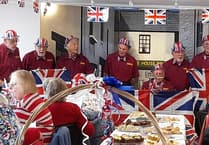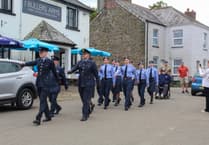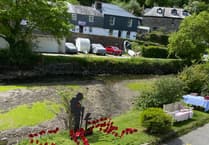The village of Botus Fleming lies between the towns of Saltash and Callington, the main focal points of the village being the church and pub.
The 12th Century St Mary's Church has had many alterations over the years which are still continuing with a bid to get the church tower and bells restored.
The current vicar is the Rev Malcolm Griffiths who divides his time between Botus Fleming, Landrake and St Erny.
He explained: 'The parish of Botus Fleming is split. It is a divided community with Botus Fleming and Hatt separated by the road from Saltash to Callington. The church is the only entity that really brings them together.'
The church has many interesting features, including a 13th Century font, the original village stocks and unusual Pentewan granite arches running the length of the church.
The church has much involvement in the community, with not only the various religious ceremonies throughout the year but also the youth group, the Challengers, who meet at the church hall every Tuesday during term time.
Smart, the modern version of Sunday School, and various fundraising activities also take place, including the carol singing which takes place for two evenings during the festive period where the singers are transported around both Hatt and Botus Fleming on tractors and trailers.
Customs
The money from the carol singing is divided between a charity, the most recent being Cancer Research, and the church.
Mr Griffiths commented: 'The carol service which took place at Christmas was the first year that I have done it when it hasn't rained!
'Botus Fleming is one of the villages where the country customs are still observed, like having the harvest festival in the pub, or the harvest auction in the case of Botus Fleming.'
There used to be a school behind the church but this has been closed for many years. The children of the village now go to Landulph School which Mr Griffiths regularly visits to keep in touch with the younger members of the community.
The Methodist chapel in the village closed last year but the Methodist minister, Pat Strickland from St Germans still has many connections with the village and she and Mr Griffiths run a house group, a low-key Bible study group.
Mr Griffiths said: 'Almost everyone in the village joins in with the church.
Weddings
'We cross the barriers of all denominations at Christmas so many people of different religions came to the church. It was the biggest gathering we have ever had.
'The church is very popular for weddings as it is your typical country church and is in a lovely setting.'
Eric Distin has been the official organist at the church since 1976 although he was playing before that time.
Eric owns a chartered surveying business in Saltash and also runs a South Devon X Limousin Continental beef suckler herd on his farm in Botus Fleming which he started in the late 1980s.
Farming has been in Eric's family for many generations.
His grandfather used to rent part of the old estate to farm and his mother's family, the Somerfield family, who were the main family in the village, have always been farmers.
One of his fields is known as the Burial field as William Martyn, once Mayor of Plymouth, bought the farm, Churchtown, in Botus Fleming, in 1706, and his son, a Doctor of Physic of Plymouth, inherited it.
Dr Martyn did not want to be buried on consecrated ground and so arranged to be buried on his own land.
A plain marble monument was erected over his grave with a long inscription carved on it that he prepared several years before his death.
The two church wardens are Gill Mingo and Bill Mills.
Bill has been church warden for seven years. Bill and his wife Rosemary started a business called Mills Milk almost 48 years ago when they lived at Pillaton.
They moved to Botus Fleming nine years ago and the business has now been taken on by their son, Graham, who lives next door with his wife Elizabeth and their children, Yvonne, Andrew and Katie. Mills Milk is now based at Saltash and Graham does the rounds and also bulk delivers further west in Cornwall.
Bill said: 'The Rev Malcolm Griffiths is, in my opinion, the best thing we've had happen to the village since sliced bread.
'The parish is quite split with the road dividing Hatt and Botus Fleming. The problem we are having now is that most people know Hatt, because it is the bigger village, and have hardly ever heard of Botus Fleming.'
A couple who have lived in the village for almost 32 years at Moditonham Park are Ronald and Rosemary Jeffery.
Their house was once the former stables and farm buildings for Moditonham House, their living room is in fact the old manure store!
Dovecote
It dates from around the 1600s and the final conversion was completed in 1964.
The Jefferys have a large dovecote in their garden which was fully functional until around 1780.
Ron was a physical metalogist, studying metals and the alterations of their properties, for a company called AEI and Rosemary was a government scientist. They moved to Botus Fleming in 1969 when Ron became a lecturer at Plymouth Technical College, which then progressed to the polytechnic and then the university.
Ron comes from the Penzance area and Rosemary joked: 'I am a Cornish woman by marriage and residence!' Rosemary has served on the parish council for 19 years and was chair for 15 of those years.
They agreed: 'We have always been very happy here. When we first moved in everyone came around with little welcome presents. It is a very nice village to live in and the small community around Moditonham has a excellent relationship. We are all there for each other.'
Rosemary told of Moditonham Quay, the first quay up the Tamar, which was fully working until the early 1900s when it brought in Plymouth 'Dock Dung', the street sweepings to be spread on the fields and took out stone from the area.
Barges
The landlord at Pineapple Inn, now a farm, used to get a shilling a load or visit by the barges. The quay was restored by the parish during 1977, the Queen's Silver Jubilee year.
Another interesting feature of the village is the Pound, next to the Church, where stray cattle were impounded - the cow keeper's cottage has long since gone.
The parish well, situated by the old school building has a statue of the Virgin Mary on it, possibly Italian, and was used until the early 1900s.
Jim Morris (pictured in panel) has been landlord of the village pub, The Rising Sun, for the past 15 years. His grandmother, Lucretia Morris, bought the pub in the 1940s and passed it on to her son, James, who in turn passed it to his son, Jim. Jim runs the pub with the help of his girlfriend, Debbie Billing, who gave birth to their daughter, Jasmin, six months ago. The pub obtained a spirits licence in the early 1950s as prior to that only beer and wine were available.
Jim said: 'We get a wide cross-section of the village in the pub, everyone comes in. We play darts and euchre and we have a New Year's Eve party each year which is always busy and a lot of fun.'
Roger and Carolyn Brown live in the village with their five children, twins Robert and Philip, 16, Matthew, 12, three-year-old Jessica and 21 month old Megan. Roger has lived in the village since 1976 and Carolyn for 17 years.
Roger is an insurance inspector and Carolyn runs their beef suckler herd. Carolyn is also a member of the parish council and has been chairman and vice-chairman.
The active parish council, made up of six members, is currently campaigning to get a 30 miles per hour speed limit through the village as it is currently set at 60. They are also planning on improving the landscaping around the roundabout on the main road and improving opportunities in the area for young people. Their biggest achievement to date is the Botus Fleming and Hatt playing field.
Carolyn has been a committee member for the Botus Challengers, the church youth group. The twins have attended the group and started their interest in table tennis. They have gone on to win the South East Cornwall U18 Championship.
Amazing
Carolyn said: 'I am on the parish council to serve the community, to be fair and even-handed. The village as a whole comes together when needed and there is a close-knit farming group.'
Kitty and Lesley Stephens live in the village and own and run a business called 'Carewatch' in Saltash, providing domiciliary care, which they started almost four years ago.
Lesley and Kitty celebrated their ruby wedding in December at St Mary's Church which was attended by many people from the village.
Kitty said: 'We have been made so welcome, lovingly and warmly by the people from the village. They are our family and it was amazing having them all there at our blessing for our ruby wedding.'
Lesley is a parish councillor and a keen bellringer and Kitty has been church secretary for the past two years.
The last time the church bells rang was when Bishop Bill Ind, the Bishop of Truro, visited the village early last year, but since then the bells and tower have been too fragile to be used.
The bells date from 1727 through to 1784 with one being recast in 1842 and bell number five being recast in 1953.
Carewatch employs 65 field staff and six office staff. Lesley, who used to be in the Navy, now does the initial training of all new staff at Carewatch and the business does much work with Caradon and Plymouth city council.

.jpg?width=209&height=140&crop=209:145,smart&quality=75)

